How Switzerland Became A Titan In The Watchmaking Industry. Swiss-made watches are some of the most famous around the world today — but why are they so well regarded, and what is it that sets them apart from other timepieces? While the answer lies predominantly in history textbooks, intersections of design, innovation, and commercial nous equally play their part.
If you inspect the dial of almost any watch that’s come up for sale at auction, you’ll likely notice at least one word other than the name of the brand: SWISS. Watchmaking in Switzerland has become so synonymous with status, value, and reliability that there’s almost cause for an eyebrow to be raised if the dial says anything else. Of course, German and Japanese watchmaking firms also produce some of the highest quality timepieces in the world, however, there’s no doubt that Swiss-made watches continue to enjoy a special position in the horological universe.
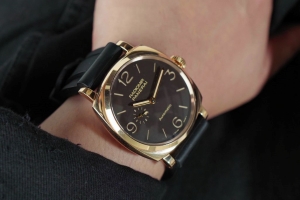
History of Swiss Watchmaking
To begin to understand the reasons behind the dominance of Swiss watchmakers, we need to look back to the 16th century. A shift in religious practice occurred when the French theologian Jean Calvin announced a ban on ornamental objects, leading jewellers and goldsmiths to put their skills to use as clock and watchmakers. While Switzerland wouldn’t exist as an independent country for another three centuries, this new focus on engineering and mechanical expertise would be the foundation of the watch industry today.
During the 17th century, these skills continued to spread across Switzerland and it was in the Jura mountains and the picturesque Vallée de Joux that industrial watchmaking was first attempted. Farmers would send their children to Geneva to learn watchmaking, who would in turn bring the skillset back to the Vallée de Joux and practice watchmaking during the winter times when it was too cold to farm.
With a growing number of households capitalising on income from both farming and watchmaking, goldsmith Daniel Jeanrichard introduced the idea of specialised workshops producing specific components. This horizontal integration of watchmaking allowed for much greater efficiency and a higher quality of work being produced in Switzerland, which in turn led to countless technological innovations and more than 60,000 watches exported from Geneva by the late 1700s.
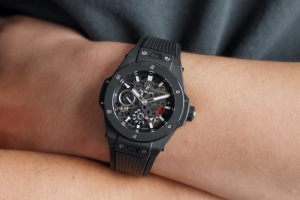
Many brands that are still in existence today were founded during this period in the 1700s, including the likes of Blancpain (1735), Vacheron Constantin (1755), Jaquet Droz (1738), and others. While the British watchmaking industry dominated during the late 18th and 19th centuries, just as the American watchmaking industry enjoyed significant success during the late 19th and early 20th centuries, Swiss watchmakers have never stopped honing their craft.
Swiss Watchmaking Innovations
The booming business attracted brilliant minds to the Swiss watch industry, which in turn led to Switzerland being the birthplace of countless timekeeping innovations. Some of the most significant early innovations include:
- 1770 — Abraham-Louis Perrelet created the first “perpetual” watch that is considered the ancestor of today’s automatic movement.
- 1795 — Swiss-born Abraham-Louis Breguet invented the “tourbillon” mechanism that significantly minimises the effect of gravity on timekeeping.
- 1816 — Louis Moinet made the first chronograph.
- 1846 — Adrien Philippe invented the pendant winding watch.

All through this period, it was pocket watches that such innovations were housed within, but it was towards the end of the 1800s when wrist-worn watches were first considered for military application. Unsurprisingly, it wasn’t particularly convenient to check the time if you were aiming a rifle with both hands, so some soldiers began strapping pocket watches to their wrists.
This led to the first-ever order of wristwatches when the German navy ordered around 2,000 watches from Swiss-founded Girard-Perregaux. These were essentially pocket watches that could be threaded with a leather strap, but by the First World War, wristwatches were issued much more widely. As a neutral country during the Second World War, Switzerland was the preferred provider of wristwatches to both Allied and Axis forces.
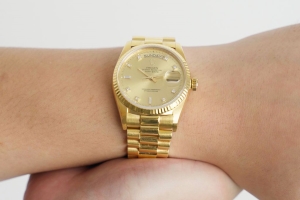
The popularity of wristwatches skyrocketed during the early to mid-20th century and the Swiss remained at the forefront of popularity and innovation. More and more complex movements were developed to fit inside wristwatch cases, including perpetual calendars, chronographs, chiming mechanisms and more. A watch was considered as essential as a wallet or keys as far as everyday objects go, and more than half of the world’s watch industry was made in Switzerland (Japan and America were the other main players).
The Birth of Luxury Watches
This unbridled success took a serious hit on Christmas day of 1969 when Seiko launched the first commercially available quartz watch. While the quartz-powered Seiko Astron cost the same as a new Toyota Corolla at the time, it wasn’t long before Japan was producing quartz watches that were cheaper and much more accurate than the Swiss, resulting in hundreds of Swiss watch brands going out of business.
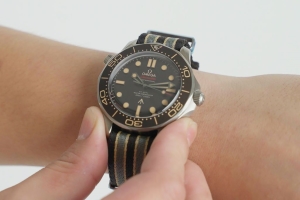
The Swiss gradually introduced their own quartz watches that could compete with Japanese-made timepieces (including from Rolex, Patek Philippe, and others), but it was in the early 70s that the idea of luxury watches was born. Of course, before that time it was more than possible to spend enormous amounts of money on a watch, but that price was almost always connected to the precious materials used and its range of functions. The idea of a luxury timepiece as a status symbol, divorced from gold weight or component complexity, arrived with the Gerald Genta-designed Audemars Piguet Royal Oak and Patek Philippe Nautilus, which were both crafted in steel and both cost more than other solid gold watches on the market.
At the same time, Swiss watch brands began more heavily marketing their traditional manufacturing techniques and quality craftsmanship, as a way of distinguishing themselves from more affordable and disposable quartz watches. Just as Genta’s design-DNA set Swiss watches apart, the marketing and commercial genius of Jean-Claude Biver returned Switzerland to the centre of the watchmaking world. He purchased the languishing Blancpain brand and one of his first marketing slogans was the now-famous line, "Since 1735, there has never been a quartz Blancpain watch. And there never will be." Tradition was celebrated and quartz technology was vilified.
Ongoing Dominance
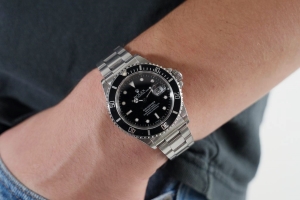
During the 80s, 90s and 2000s, this celebration of Swiss-made watches only gained momentum and remains one of the most important drivers in the global watch industry today. Alongside this, the growing dominance of group-owned watchmaking brands is undeniable.
These groups include the likes of LVHM (which has a portfolio of more than 70 brands including TAG Heuer and Hublot across half a dozen luxury industries), Richemont (owners of brands such as Cartier, IWC, Panerai, and more) and the Swatch Group (that owns Omega, Longines, Tissot, and a dozen others). Large watchmaking groups own factories that can then share R&D costs and manufacturing resources, ensuring high-quality timepieces and persistent technological development despite their products becoming anachronistic (who needs a watch when they’ve got a phone in their pocket, after all).
Switzerland isn’t the only country in the world making excellent watches. Watchmakers from Germany such as A. Lange & Söhne and the more affordable NOMOS are world-class, just as Japan’s Grand Seiko produces incredible watches and has earned a cult following of die-hard enthusiasts. However, Switzerland has been in the watchmaking game for a very long time and the reasons for their success are as justified as they are hard-earned.
